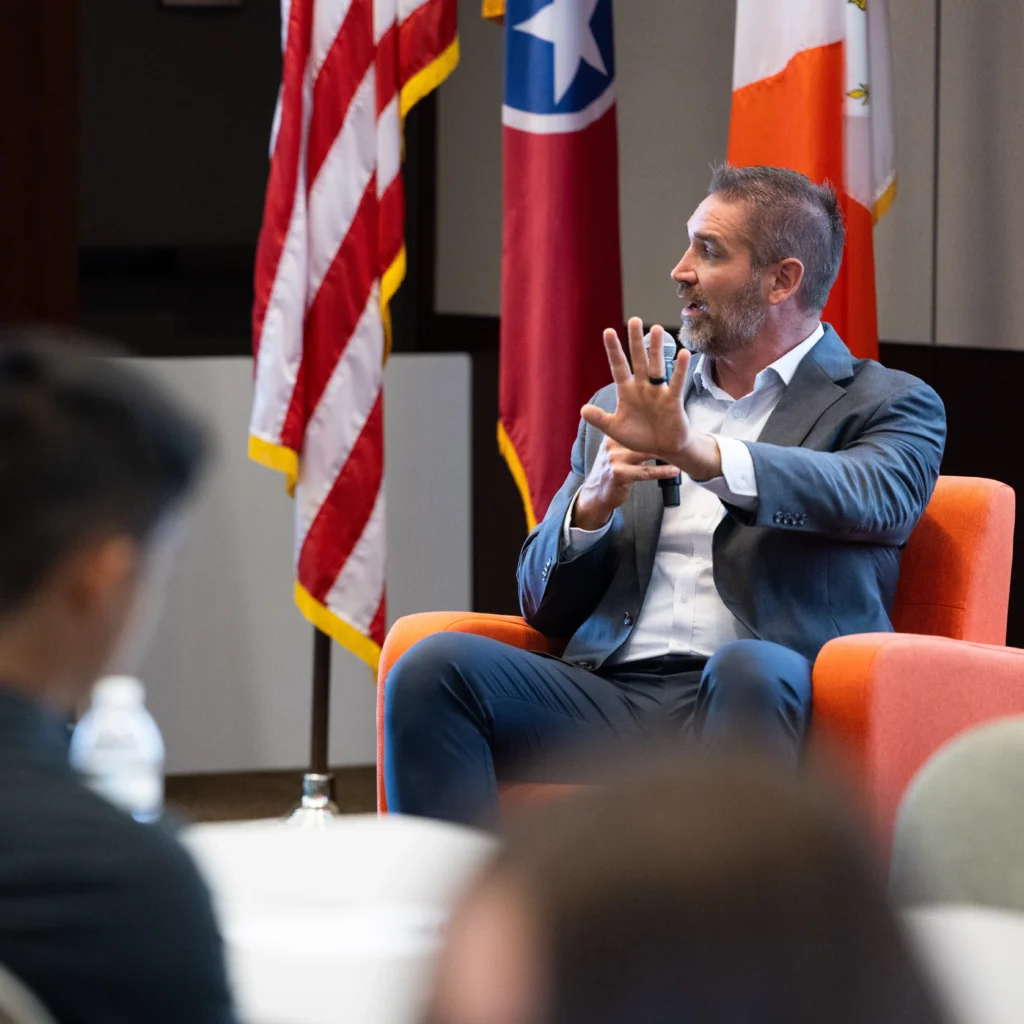Facing Tennessee’s Grand Challenges In and Out of the Classroom

Knoxville, Tennessee – December 2, 2024.
Tennessee faces the three grand challenges of advancing K-12 education, strengthening rural communities, and overcoming addiction. The University of Tennessee System hopes to address these challenges through collaboration and turn them into strengths. For the second time, the Howard H. Baker Jr. School of Public Policy and Public Affairs partnered with University Honors to host the semester-long Grand Challenges Program.
The program offers students a unique opportunity to participate in expert-led discussions and peer engagements to gain a more in-depth understanding of how these challenges impact Tennessee and local communities. Throughout the semester, a session was dedicated to each content area, including public servants and academics.
Knox County Schools Superintendent Jon Rysewyk joined UT College of Education, Health, and Human Services Dean Ellen McIntyre to discuss advancing K-12 education. Commissioner Marie Williams, who heads Tennessee’s Department of Mental Health and Substance Abuse Services, discussed overcoming addiction with Jennifer Tourville, executive director of the UT Institute for Public Service’s SMART Initiative. Baker School Dean Marianne Wanamaker moderated a panel discussion on strengthening rural communities, including Anderson County Mayor Terry Frank, Roach County Mayor Wade Creswell, and Associate Professor Sreedhar Upendram from the Department of Agricultural and Resources Economics.
Student Reflections
Students found the sessions rewarding as they provided new insights into their communities. For some, it was the ones they call home; for others, it was the communities they have cared about since coming to the University. Hearing from experts in the field provided first-hand accounts of the challenges faced by communities across the state.
Multiple students highlighted the connections made with other students. Specifically, knowing that they were not the only ones concerned about these challenges.
Learning about Tennessee’s specific challenges was eye-opening for some, who did not realize how much of an impact they were having on society. For others, knowing that officials were actively working toward solutions gave them hope. However, listening to the issues and workable solutions also showed how complex and interconnected these challenges are and how it will take collaboration to address them effectively.
Taking the lessons outside the classroom
The students wrapped up by learning how they could start working on the grand challenges. Three Baker School students shared their experiences working in internships and research related to the grand challenges.
Eli Hicks, a sophomore public affairs major, discussed his summer internship with the Tennessee Economic and Development Department. Eli participated in the inaugural Grand Challenges fellowship program in 2023. The internship allowed him to apply what he learned as a Grand Challenge fellow while working on grants for the community and exploring what projects needed funding. Three extensive needs that Hicks saw were for EMS services and equipment, wastewater, and sewer systems.
Sydnie Kingman, a junior studying economics and minoring in public policy analytics, interned at the Knoxville/Knox County Joint Office of Housing Stability. She completed a study of the homeless mortality rate, finding that substance abuse and overdose were overwhelmingly common causes of death. One of her key findings was the difference between zip codes, showing the areas with more access to health care and treatments impacted the mortality rate.
Addie Davis, a senior early childhood education major and Baker Scholar, is researching child literacy and its impact on the well-being of children. Working under Dr. Zoi Traga-Philippakos, associate professor of literacy education, she helped interview teachers throughout the Appalachian region. Her end goal is to present policy recommendations to improve child literacy throughout the region.
Each student highlighted how the Baker School programs and internships helped them take what they learned in the classrooms and apply it to real-world scenarios. These hands-on experiences help determine what direction to take their careers. The Grand Challenges Fellows program gave the students a way to get involved in these policy areas or areas connected to some of Tennessee’s greatest challenges.